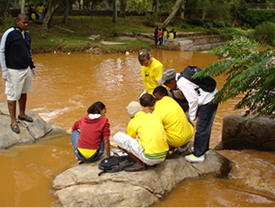| 50% of you think that the South African Government has the potential to make the biggest impact on reducing carbon emissions in South Africa; | |
| 8% opted for the technology sector; and | |
| 42% opted for private industry. |
Shuttle Discovery landed for the last time at Florida’s Kennedy Space Centre on 9 March 2011. Discovery has completed 39 space voyages (its first being on 30 August 1984), has spent a total of 365 days in space and travelled more than 238 million kilometres during it’s lifetime.

 |
What’s this creepy crawly? ZooClub members on an ecology excursion collect and study samples of “wild life”. |
|
 |
ZooClub members analysing the Apies River’s water, which flows through the National Zoological Gardens in Pretoria. |
Green is the colour of conservation and a way of life we should all proactively adopt. We need to think green, act green and live green so that we protect our environment and its natural resources.
Conservation, just like charity, begins at home. The National Zoological Gardens’ (NZG) Department of Conservation Education and Public Engagement in Science emphasise urban biodiversity in their programmes because most of their visitors (including schools) come from urban areas, and can help out by conserving the environment in their own backyard.
The NZG is the largest zoo in South Africa with more than 600 000 visitors each year. It is situated in Pretoria and is an NRF national facility.
“Our school lessons focus on urban species wherever possible,” says Ulrich Oberprieler, manager of the department. Two of the NZG ZooClub projects that are currently running focus on the Apies River’s water quality (started in 2010) and Alien Plant Control. ZooClub members have to be involved in all of the projects’ practical activities.
The ZooClub’s mission is to:- Inspire young people by providing them with access to participate in exciting, hands-on science activities;
- Improve their science performance and skills;
- Give them a supportive environment that encourages their intellectual development; and
- Encourage them to choose Life Science as a career path.
The ZooClub will participate in the Global Water Experiment, which forms part of the International Year of Chemistry, as part of their water quality audit. This experiment will give students from across the globe an opportunity to study the aspects of water quality and purification in their own environment. Following that they will post their results on a website.
The Alien Plant Control project involves the ZooClub members using experimental procedures to find out what method of control will work best in the zoo.
Join the ZooClub and you can take part in exciting activities including:- A presentation on bats;
- Activities about urban forests done in collaboration with the South African National Biodiversity Institute;
- A leadership weekend on developing Science Expo projects; and
- An essay competition on “The Concern for Deforestation in Today’s Society”.
Biodiversity Youth Symposium
The NZG’s Second Biodiversity Youth Symposium is a very exciting event that they are hosting on 30 July 2011. It is done in collaboration with the Gauteng Department of Education and provides an excellent opportunity for life science learners to let their voices be heard, work together, contribute, and make changes to biodiversity conservation and the protection of the environment. Learners from Grades 10–12 are targeted for the symposium.
For a full 2011 ZooClub programme visit www.nzg.ac.za/education/zooclub.php.
Join the ZooClub
Learners in Grades 7–11 who have completed the NZG’s Junior Conservation course may join the ZooClub. For more information contact +27 12 328 3265, extension 173, or email sol@nzg.ac.za or piet@nzg.ac.za.
